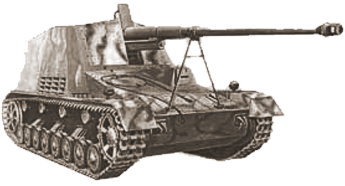October 1942 in Stalingrad
In October of 1942 the German Sixth Army, under General Friedrich Wilhelm Ernst Paulus, came as close as perhaps it ever did to defeating the Soviet defenders of Stalingrad - led most prominently by General Vasily Ivanovich Chuikov's 62nd Army. At best, by October 1942 the 62nd Army numbered 50,000 men and 80 tanks. According to those present it was nowhere near these numbers and the Germans held overwhelming advantages in men and machines.
In an assault beginning on October 14th, five German divisions - over 90,000 men, 2,000 guns and mortars, 300 tanks, and waves of Stuka's forged a path just over two miles wide to the main source of Russian resistance in the city; at the Tractor Plant and Barrikady factory. The assault began with a one and a half hour air and artillery bombardment that crushed everything within 100 meters of the frontlines. In spite of the sheer scale of the assault it actually resembled more of a technical tour de force then it did a crude battering ram. For instance, the Germans had prepared thoroughly, including carefully mapping Russian command posts by intercepting radio signals and then targeting each one for destruction. Thus, the Germans quickly decapitated the defenders, burying entire Russian command posts under a fury of bombs and shells. In spite of a brave and spirited resistance on the part of the Russians, actually driving off the first wave and shocking the attackers who otherwise had thought nothing could have survived the bombardment, the Germans regrouped and pushed through.
German infantry and machine gun teams flowed around the Russian positions as panzers prowled the factory floors, climbing rubble and pouring point blank cannon and machine gun fire at Russian soldiers fighting with grim determination. The fighting dragged on with an unprecedented savagery as the great industrial works changed hands several times before the German attackers finally wrested control over the factories from Chuikov's men and advanced to the Volga. The Germans sought to chop up the Russian positions, with mini-encirclement battles occurring across the city. The Russian defense flowed more flexibly, emphasizing constant small-scale counterattacks in an effort to wear down the powerful German assault. The bloodshed quickly reached epic proportions; on the night of October 15th alone over 3,500 Russian wounded were evacuated across the river. The horror of the battle was unspeakable. One survivor, Anatoly Mereshko - a staff officer from the 62nd Army, afterward described these days as an utter hell with the sun virtually blotted from view by the fire and smoke while the noise of thousands of weapons discharging at once drowning out the sound of individual weapons.
By the night of the 14th the Germans had split the 62nd Army in two; even the elite 37th Guards Rifle Division had been annihilated - fighting to nearly the last man in a desperate stand within the Tractor Factory. The crucial hours in the battle had arrived as Chuikov's defenses cracked. By 9:40pm Chuikov, had nothing left with which to stop the Germans, and with his HQ only 800 meters from the Volga River, he contacted the Stalingrad Front and requested permission to withdraw his command post across the Volga. Local party representative Nikita Khruschev called Chuikov back and insisted he remain in the city, that Stalingrad could not fall. It appears that shortly thereafter, at 1:00am on October 15th Stalingrad Front Order Number 205 even temporarily stripped Chuikov of his command and his Chief of Staff Krylov was put in charge. Meanwhile Stalin, terrified the Germans would seize the city, raged at the Stalingrad Front's commander, General Andrey Ivanovich Yeryomenko, for not giving Chuikov enough resources and hoarding too many men on the eastern bank of the Volga. As Stalin raged the Germans continued to hammer Chuikov's shattered defenses. Chuikov yet again requested he be allowed to withdraw. Again, Yeremenko and Khruschev refused. This time however they finally released the 138th Rifle Division to reinforce Chuikov's wobbling positions, now relying on command and staff personnel to man front line trenches. As it turned out such was the weakened state of attacker and defender alike that these reinforcements proved pivotal. By the 16th and with the support of the 138th Rifle Division, its lead regiment having crossed the Volga on the night of the 15th, the 62nd Army held. Although driven into a narrow strip along the Volga only a few hundred meters deep, the 62nd Army had survived; the immediate crisis had passed.
by Steven Douglas Mercatante



Post new comment